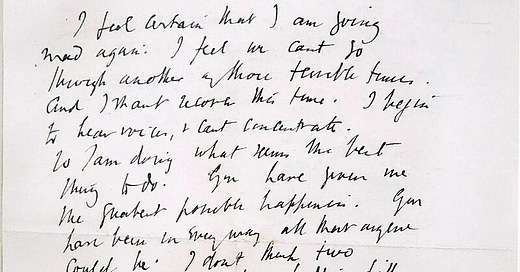The Last Words of Virginia Woolf
I studied "Who's Afraid of Virginia Woolf" before I read anything actually written by Woolf. In an education that focused heavily on modernist writers, that seems like an oversight. It's also probably an artifact of my generation, where men writers were considered more important than women writers, even by women teachers. Although I suspect it was an oversight on their part, patterning their teaching on how they were taught themselves, that's how these things are perpetuated.
Modern readers, critics, and historians make much of Woolf's mental state. While she saw many doctors in her lifetime, none of them were able to "cure" her. Modern psychologists suggest she may have suffered from bipolar disorder or cyclical clinical depression. Having been diagnosed with cyclical clinical depression myself, I recognize some of the things she went through.
At the peak of Woolf's depression cycles, she made multiple attempts to take her own life, all failed. On March 28, 1942, Woolf filled her pockets with stones and threw herself in the river Ouse. Her body wasn't recovered until April 18, almost three weeks later.
Woolf left a note for her husband. Clearly, her mind was still very clear when she wrote it. But after a lifetime of struggling with depression, she chose to end it.
Dearest,
I feel certain that I am going mad again. I feel we can't go through another of those terrible times. And I shan't recover this time. I begin to hear voices, and I can't concentrate. So I am doing what seems the best thing to do. You have given me the greatest possible happiness. You have been in every way all that anyone could be. I don't think two people could have been happier till this terrible disease came. I can't fight it any longer. I know that I am spoiling your life, that without me you could work. And you will I know.
You see I can't even write this properly. I can't read. What I want to say is I owe all the happiness of my life to you. You have been entirely patient with me and incredibly good. I want to say that—everybody knows it. If anybody could have saved me it would have been you. Everything has gone from me but the certainty of your goodness. I can't go on spoiling your life any longer. I don't think two people could have been happier than we have been.
V




